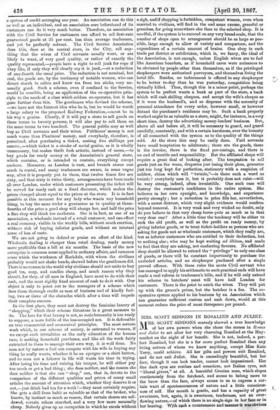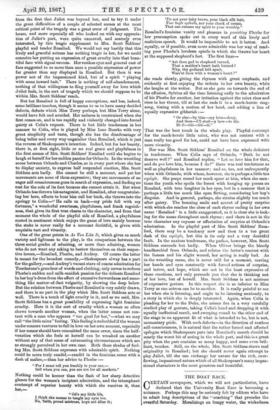MRS. SCOTT SIDDONS IN ROSALIND AND JULIET.
MRS. SCOTT SIDDONS scarcely showed a true knowledge of her own powers when she chose the scenes in Romeo and Juliet to act after her very charming Rosalind at the Hay- market on the night of her benefit. She is not, indeed, a per- fect Rosalind, but she is a far more perfect Rosalind than any living actress of whom we know anything, except Miss Kate Terry, could achieve. All her gifts and powers suit Rosalind, and do not suit Juliet. She is exceedingly beautiful, but her face, though it can look tender, cannot look impassioned. Her fine dark eyes are restless and conscious, not Italian eyes, not " liberal givers," at all. A beautiful Grecian nose, which slopes continuously from the forehead, and seems to belong more to the brow than the face, always seems to us to express a cer- tain want of spontaneousness of nature and a little conscious- ness of self. Her mouth is gentle, and has a capacity of great sweetness, but, again, it is sweetness, tenderness, not an over- flowing nature,—of which there is no single sign in her face or in her bearing. With such a countenance and manner it was obvious
from the first that Juliet was beyond her, and to try it under the great difficulties of a couple of selected scenes at the most critical point of the tragedy was a great error of judgment. The house, and more especially all who looked on with any apprecia- tion of Juliet's part, were quite unmoved, and scarcely even interested, by this tragic supplement to Mrs. Scott Siddons' playful and tender Rosalind. We would not say hastily that this lively and graceful actress has nothing tragic in her, for we could conceive her putting an expression of great cruelty into that beau- tiful face with signal success. Her restless eyes and general cast of face suggested to us more than once a possible expression of power far greater than any displayed in Rosalind. But then it was power not of the impassioned kind, but of a spirit " playing with some inward bait." There is nothing of self-abandonment, nothing of that willingness to fling yourself away for love which Juliet feels, in the sort of tragedy which we should suppose to be within Mrs. Scott Siddons' reach.
But her Rosalind is full of happy conceptions, and has, indeed, some brilliant touches, though it seems to us to have many decided defects, defects which Miss Terry perhaps, but Miss Terry alone, would have felt and avoided. Her sadness is constrained when she first comes on, and is too rapidly and violently changed into forced gaiety at Celia's request. There is but little tenderness in her manner to. Celia, who is played by Miss Ione Bourke with very great simplicity and taste, though she has the disadvantage of being taller and every way ungainlier than Rosalind, which is just the reverse of Shakespeare's intention. Indeed, but for her beauty, there is, at first sight, little or no real grace and playfulness in the first scenes of Mrs. Scott Siddons' Rosalind until she begins to laugh at herself for her sudden passion for Orlando. In the wrestling scene between Orlando and Charles, as in every part where she has to display anxiety, to express half suspended emotion, Mrs. Scott Siddons acts badly. She cannot be still a moment, and yet her movements are none of them expressive; they are movements of an eager self-consciousness gone in search of expression, and finding no rest for the sole of its foot because she cannot attain it. But when Orlando has thrown his antagonist, and Rosalind, after congratulat- ing her hero, affects to hear him call her back, she throws into the apology to Celia—" He calls us back—my pride fell with my fortunes," a wonderful sweetness, playfulness, and frank roguish- ness, that gives its first true charm to the character, and from that moment the whole of the playful side of Rosalind, a playfulness rooted in sentiment which enjoys the game of love mainly because the stake is never really for a moment doubtful, is given with exquisite tact and vivacity.
One of the great points in As You Like it, which gives so much variety and lightness to the play, is the comparison between the three social grades of admiring, or more than admiring, women who do not want any asking to bestow themselves on their respec- tive lovers,—Rosalind, Phoebe, and Audrey. Of course the latter is meant for the broadest comedy,—Shakespeare alway has a part for the gallery,—and Audrey's vacant stare of coarse admiration for Touchstone's grandeur of words and clothing, only serves to redeem Phoebe's sudden and milk-maidish passion for the delicate Rosalind in her boy's dress from the effect of excessive forwardness and some- thing like matter-of-fact vulgarity, by showing the deep below. But the relation between Phcebe and Rosalind is very subtly drawn, and there is no part in the play which Mrs. Scott Siddons acts so well. There is a touch of light cruelty in it, and as we said, Mrs. Scott Siddons has a great possibility of expressing light feminine cruelty. Here it is the sort of cruelty which a woman so often shows towards another woman, when the latter seems not con- tent with a man who appears "too good for her,"—what we may call "the little minx" feeling. This feeling is redoubled if the woman undercensure ventures to fall in love on her own account, especially if her censor should have committed the same error, since the half- vexation which she feels at herself can be wreaked on another without any of that sense of extenuating circumstances which are so strongly perceived in her own case. Both these shades of feel- ing Mrs. Scott Siddons expresses with admirable spirit. Nothing could be more truly candid,—candid in the feminine sense with a dash of malice,—than her advice to Phoebe :—
" For I mast tell you frankly in your ear,—
Sell when you can, you are not for all markets."
Nothing could be keener than the flash of her sharp detective glance for the woman's incipient admiration, and the triumphant contempt of superior beauty with which she receives it, than her,— " Od's my little life, I think she means to tangle my eyes too. No, 'faith, proud mistress, hope not after it ;
'Tie not your inky brows, your black silk hair, Your bugle eyeballs, nor your cheek of cream, That can entame my spirit to your worship."
Rosalind's feminine vanity and pleasure in punishing Phcebe for her presumption spoke out in every word of this lively and malicious speech. It would be impossible to act it better. And equally, or if possible, even more admirable was her way of read- ing poor Phoebe's lovelorn epistle in which she throws her heart at the supposed shepherd's feet. The first lines— "Art thou god to shepherd turned, That a maiden's heart bath burned? Why, thy godhead laid apart, Warr'st thou with a woman's heart ?"
she reads slowly, giving the rhymes with great emphasis, and evidently at first enjoying the tribute to her own beauty, while she laughs at the writer. But as she gets on towards the end of the effusion, Sylvius all the time listening sadly to the admiration of his Phcebe for another, her irritation against the minx rises and rises in her throat, till at last she ends it in a mock-heroic sing- song, timing with a motion of her head, and adding a line of equally expressive gibberish :— " Or else—by him—my love—deny, And then—I'll stud—y how—to die. Ri That was the best touch in the whole play. Playful contempt for the mock-heroic little minx, who was not content with a man really too good for her, could not have been expressed with more vivacity.
Nor was Mrs. Scott Siddons' Rosalind on the whole deficient in tenderness. When Celia says of Orlando, " Doth he not deserve well ?" and Rosalind replies, " Let me love him for that, and do you love him, because I do ?" there was real tenderness as well as playfulness in her manner ; and so, too, not unfrequently when with Orlando, with whom, however, she is perhaps a little too espiegle. She peeps round her mock spear at him, when she men- tions the youth who spoils the forest with hanging up poems on Rosalind, with true laughter in her eyes, but in a manner that is perhaps a little too much like open flirting, considering her boy's disguise. And in general, perhaps, she strains slightly too much after gaiety. The beaming smile and accent of pretty surprise with which she reaches the close of each rhyme ending in her own name Rosalind' is a little exaggerated, as it is clear she is look- ing for the name throughout each rhyme ; and there is not in the true character any coyness or affectation of surprise at Orlando's admiration. In the playful part of Mrs. Scott Siddons' Rosa- lind, there may be a tendency now and then to a too great dash of the espiegle, but this is its only and a very doubtful fault. In the anxious tenderness, the pathos, however, Mrs. Scott Siddons succeeds but badly. When Oliver brings the bloody handkerchief from Orlando, and relates the latter's contest with the lioness and his slight wound, her acting is really bad. As in the wrestling scene, she is never still for a moment, moving her hands and eyes constantly with forced actions of surprise, and terror, and hope, which are not in the least expressive of these emotions, and only persuade you that she is thinking not of her love, but of herself. Mrs. Scott Siddons is not mistress of expressive gesture. In this respect she is as inferior to Miss Terry as one actress can be to another. It is really painful to see her when she is listening, and ought to be listening anxiously, to a story in which she is deeply interested. Again, when Celia is pleading for her to the Duke, she misses fire in a very carefully studied play of gesture, taking Celia's hand and dropping it with equally ineffectual result, and sweeping round to the other end of the stage in an apparent fit of what is intended to be, but is not, momentary pride. With such defects—in the direction of restless sell-consciousness, it is natural that the rather forced and affected epilogue which Shakespeare puts into Rosalind's mouth should be nearly the worst bit of acting in the whole part, and this is a great pity when the part contains so many happy, and some even bril- liant, touches. Still, on the whole, Mrs. Scott Siddons shows real originality in Rosalind ; but she should never again attempt to play Juliet, till she can exchange her nature for the rich, over- flowing, impassioned nature which of all Shakespeare's many impas- sioned characters is the most generous and bountiful.































 Previous page
Previous page